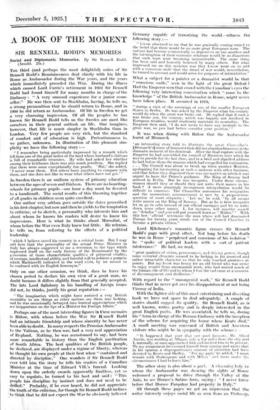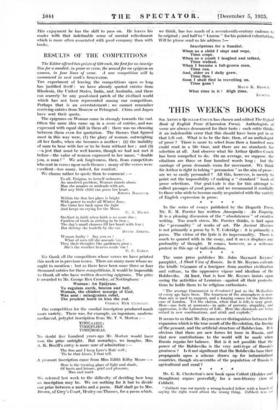A BOOK OF THE MOMENT
SIR RENNELL RODD'S MEMORIES
Social and Diplomatic Memories. By Sir Rennell Rodd. ' (Arnold. 218.)
Tim third (and perhaps the most delightful) series of Sir
Rennell Rodd's Rethinikenceis deal chiefly with his life in Rome as Ambassador during the War years, and the years which immediately preceded the- War. Burn* the illness which caused Lord Currie's retirement in 1002 Sir Rennell Rodd had found himself for many months in charge of the
Embassy : " A very unusual experience for a junior coun- sellor." He was then sent to Stockholm, having, he tells us, a strong premonition that he should return to Rome, and in 1908 he did return as Ambassador. Of life in Sweden we get a very _charming impression. Of all the peoples he has known Sir Rennet Rodd tells us the Swedes arc most like ourselves in their general outlook on life. One imagines, however, that life is much simpler in Stockholm than in London. Very few people are very rich, but the standard of comfort and of education is high Pretentiousness is, we gather, unknown. In illustration of this pleasant sim- plicity we have the following story
" I remember being particularly impressed by a remark which fell from one of the great ladies of the laud whose husband's chateau is full of remarkable treasures. My wife had asked her whether among their heirlooms there was also much jewellery. She replied that there were some exceptionally fire pearls. But,' she added, I never wear them. Few others have anything to compare with 'them, and one does not like to wear what others have not got.' "
In Sweden there is an uniform _ system of primary education ,between the ages of seven and thirteen. There are no boarding-
schools for primary pupils—one hour a day must be devoted to a handicraft. The social results of this throwing together of all grades in children seem quite excellent.
Our author very seldom goes .outside the dates proscribed
in his first chapter, but now and then he yields to the temptation to criticize, or to sketch, a personality who interests him and about whom he knows his readers will desire to know his impressions. Here is what . he thinks about Mussolini, of whom before the War even Italy knew but little. He refrains,
h tells us, from referring to the effects of a political leadership
" which I believe saved his country in a critical hour. But I may add here that the personality of the actual Primo Minister in Italy has always suggested to me a reversion to the typo which impressed itself on tho early history of the Renaissance by the possession of those characteristic qualities of primeval vitality, of courage, intellectual ability and forceful will to achieve a. purpose which. Machiavelli indicated in the word Virtu, by no means to he confused with its English homonym."
Only on one other occasion, we think, does he leave his chosen period to declare his own view of a great man, no doubt because it differs slightly from that generally accepted.
The late Lord Salisbury in his handling of foreign issues did not, he thinks, justify his great reputation :—
" The imagination which might have assisted a very British mentality to see things as other nations seo them was lacking, 'and he _was occasionally betrayed into ironical appreciations which are inopportune on the lips of a Minister for Foreign Affairs."
Perhaps one of the most interesting figures in these memoirs is Billow, with whom before the War Sir Rennell Rodd
had an intimate friendship and whose sincerity he has never been able to doubt. In many respects the Prussian Ambassador to the Vatican, as he then was, had a very real appreciation of Ergland. Nothing, he was accustomed to say, had been more remarkable in history than the English pacification
of South Africa. The best qualities of the British people, he 'declared, are displayed under a reghtie of liberty, Whereas he thought hiS- own people at their best when " contained and
directed by discipline." One wonders if Sir Rennell Rodd ever told him the story he tells his readers of" a Cahadian
Minister at the time of Edward VII.'s funeral. Looking dowri upon the orderly crowds apparently limitless,- yet .so
easy to regulate, he turned to his host and said : "This people has discipline by instinct and does not need to be
drilled." Probably, if he ever heard, he did not appreciate !the truth of the criticism, for though.Sir Rennell Rodd inclines
to think that he did not expect the War he obviously believed Germany capable of terrorizing the world—witness the following story :—
" Lii:ow observed to me that he was gradually coming round to the belief that there would be no more great European wars. The nations had become economically so dependent on one another and the interruption of their economic relations would be so disastrous that such wars were becoming inconceivable. The same thing has been said and honestly believed by many others. But what impressed me on this occasion was that Efitow went on to add with a conscious smile that the dread of war would, nevertheless, be turned to account and would serve for purposes of intimidation."
What a subject for a painter or a dramatist would be that " conscious smile," seen in the light of the great Defeat I Had the Emperor seen that crowd with the Canadian's eyes the following very interesting conversation which " came to the knowledge " of the British Ambassador in Rome, might never have taken place. It occurred in 1913, " during a visit of the sovereign of ono of the smaller European States to Berlin. Ho was asked by tho Emperor what his country would do when the great war broke out. Ho replied that if Such a war broke out, his country, which was happily not involved in European rivalries, would studiously maintain its neutrality.- The Emperor then said, I do not mean to have any neutrals in the great war, so you had better consider your position.'"
It was when dining with Billow that the Ambassador learnt of Bismarck
an interesting story told to illustrate the great Chancollor'R [Bismarck's] sense of humour which did notabandon himeven at the dramatic moment of his dismissal. After the final rupture with the Emperor he had assembled the council of Ministers over which he was to preside for tho last timo, and in a brief and dignified address ho laid before them the reasons which had compelled his resignation. . . . The Council was about to break up when another Minister, apologizing for intervening at such a moment with other business, said that before they dispersed there was one matter on which it was urgent to have the Prince's guidance. The King of Saxony had arrived in Berlin. But he was incognito. Under those circum- stances should they or should they not write their names in his book ? A more amazingly incongruous interpellation would In difficult to conceive. Tho Chancellor announces his resignation and the momentous announcement is met by a preposterous question of court etiquette : Let us,' he said, by all means write names on the King of Saxony. But as ho is hero incognito let us go in cabs instead of our official carriages and let us write down some other names. I, for instance, will inscribe myself as " Schultz " and you will put yourself clown as " Midler." ' With this last official ' utterance the man whose will had dominated Europe for twenty years strode out of the Council Chamber to become a private citizen."
Lord Kitchener's romantic figure crosses Sir Rennell Rodd's page with great effect. Not long before his death he was in Rome " perplexed and conscious of his isolation " he " spoke of political leaders with a sort of patient intolerance." He had, we read, • •
" great qualities of vision, perseverance, and driving power, though some essential elements scorned to be lacking in his -reserved and rather intractable character so that ho only touched greatness at points. But My heart was heavy for an'old friend who was never to enjoy respite from uncongenial work, who had missed much of the human side of life and to whom I fear the end came at a moment of discouragement and disillusion."
With regard to the " uncongenial work," Sir Rennell Rodd thinks that he never got over his disappointment at not being Viceroy of India.
With thc lighter side of this most entertaining and diverting book we have not space to deal adequately. A couple of stories should suggest its quality. Sir Rennell Rodd, as is well known, writes poetry and is deeply interested in the great English poets. He was associated,' he tells us, during his " term in charge of the Roman Embassy with the inception of the scheme for acquiring the hbuse where Keats died." A small meeting was convened of British and American visitors who might be in -sympathy with the scheme
" It happened that year that our poet laureate, Mr. Alfred Austin, was residing at Albano, only a few miles from tho city and - I, naturally, at once approached him and invited him to be present. To my amazement he excused himself from coming and wrote that in his opinion a disproportionate amount of attention had been devoted to. Keats and Shelley. For my part,' ho added, I must remain with Shakespeare and with Milton' and there under the . circumstances I had to leave him."
The other story is also about a poet. A charming lady to whom the .Ambassador was showing the sights of Rome welcOmed a, proposal to drive through the Valley_ of the AniO, to see Horace's Sabine farm, saying : " I never knew
before that Horace Farquhar, had propcity in Italy." All through ihese pages we get an impression that the writer intensely enjoys social life as seen from an Embassy, This enjoyment he has the skill to pass on. He leaves his reader with that indefinable sense of mental refreshment which is more often associated with good company than with books.



































































 Previous page
Previous page